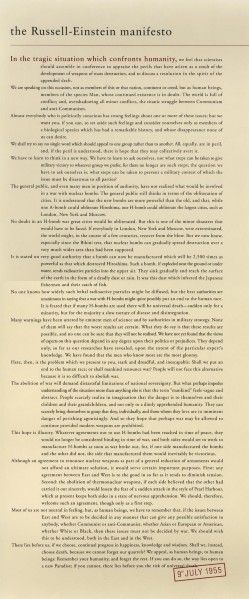Here, then, is the problem which we present to you, stark and dreadful and inescapable: Shall we put an end to the human race; or shall mankind renounce war? People will not face this alternative because it is so difficult to abolish war.
The abolition of war will demand distasteful limitations of national sovereignty. But what perhaps impedes understanding of the situation more than anything else is that the term "mankind" feels vague and abstract. People scarcely realize in imagination that the danger is to themselves and their children and their grandchildren, and not only to a dimly apprehended humanity. They can scarcely bring themselves to grasp that they, individually, and those whom they love are in imminent danger of perishing agonizingly. And so they hope that perhaps war may be allowed to continue provided modern weapons are prohibited.
This hope is illusory. Whatever agreements not to use H-bombs had been reached in time of peace, they would no longer be considered binding in time of war, and both sides would set to work to manufacture H-bombs as soon as war broke out, for, if one side manufactured the bombs and the other did not, the side that manufactured them would inevitably be victorious.
 Scene
Scene


 1st Slide
1st Slide
 Branching Point
Branching Point
 Module: Wissenschafts als Herausforderung: Manifeste
Module: Wissenschafts als Herausforderung: Manifeste Sequence: Einstieg Manifeste
Sequence: Einstieg Manifeste Branching Point: Scientists Against Nuclear War
Branching Point: Scientists Against Nuclear War Slide: Göttingen Declaration, April 12, 1957 (1)
Slide: Göttingen Declaration, April 12, 1957 (1) Back
Back


